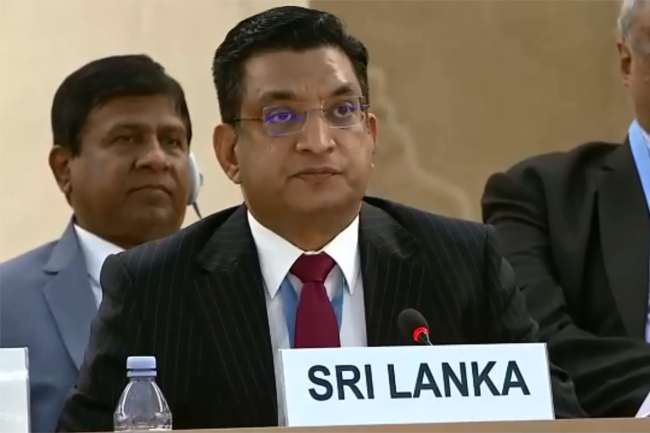Minister of Foreign Affairs M.U.M. Ali Sabry PC told The Morning yesterday (18) that the draft resolution on Sri Lanka, co-sponsored by the Core Group of countries on Sri Lanka at the ongoing 51st United Nations Human Rights Council (UNHRC) session, is “unnecessary” and “divisive”, and that it will be resisted by the Government of Sri Lanka (GoSL) whether or not it has the votes to defeat it.
When queried by The Morning regarding the Government’s stand on the draft resolution by the Core Group, Minister Sabry said: “We have clearly told them that at this point in time it is unnecessary, and that we don’t want any divisive mechanism. We need the support and blessings of the international community,”
Minister Sabry went on to stress that whether they have the resolution or not, it is the duty of the Government to ensure accountability and reconciliation through the domestic mechanism.
“It is our duty as Sri Lankans to find accountability and reconciliation through the domestic mechanism. This will be continued, but if there is anything beyond that, and any external mechanism that will violate our Constitution, whether we get the numbers or not, we will continue to resist, because we cannot agree on that,” he said.
The fresh draft resolution on Sri Lanka noted the need for power devolution, the conduct of polls, addressing the plight of missing persons, replacing the Prevention of Terrorism (Temporary Provisions) Act, and accountability for protest-related violence, whilst recognising the efforts of the Government of Sri Lanka (GoSL) to address the economic crisis, including the staff-level agreement with the International Monetary Fund (IMF). This newly drafted resolution on Sri Lanka, co-sponsored by the Core Group of countries on Sri Lanka, namely, the UK, Canada, Germany, Malawi, Montenegro, North Macedonia, and the US, was made public early last week.
Meanwhile, commenting on the resolution put forward by four US senators calling for a comprehensive international approach to address the current political and economic crisis in Sri Lanka, Minister Sabry said: “Let us see how that goes, different people are working in this regard.”
This US senate resolution would be brought before the United Nations General Assembly (UNGA), which is to convene in New York this week. US Senate Foreign Relations Committee Chairman Senator Bob Menendez (D-N.J.), with Senators Dick Durbin (D-Ill.), Patrick Leahy (D-Vt.), and Cory Booker (D-N.J.), would submit this resolution.
Minister Sabry also said that he had not held any discussions with the Sri Lankan diaspora organisations while at the ongoing United Nations Human Rights Council (UNHRC) sessions in Geneva, Switzerland.
The delegation representing the Sri Lankan Government, headed by Minister of Foreign Affairs M.U.M. Ali Sabry PC, assured the UNHRC on 12 September that the Sri Lankan Government endeavours to establish a credible truth-seeking mechanism within the framework of its Constitution. The contours of a model that would suit the particular conditions of Sri Lanka are under discussion.
Minister Sabry addressing the 51st UNHRC sessions on 12 September in Geneva, Switzerland noted the recommendations of the Presidential Commission of Inquiry have resulted in progressive amendments to the Prevention of Terrorism Act (PTA), and the release of detainees.


